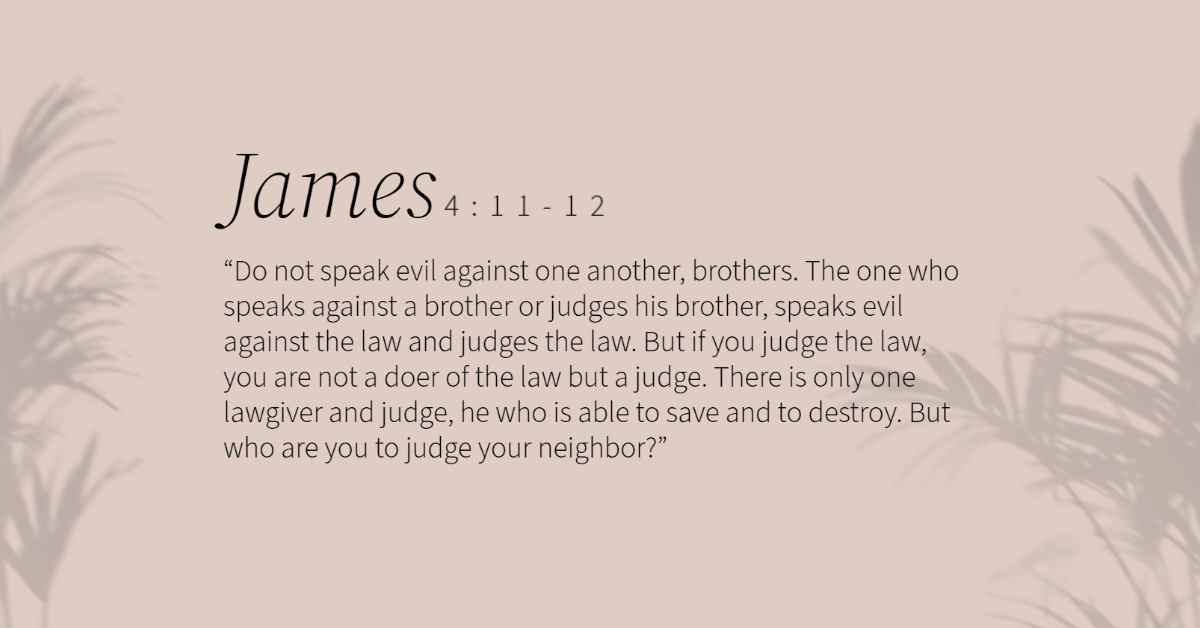Last month the blog was focused on discussing the differences between godly wisdom and worldly wisdom. James ends chapter 3 with, "And a harvest of righteousness is sown in peace by those who make peace." (verse 18) He jumps from talking about those who make peace to those who cause quarrels and fights in chapter 4.
Causes

Remember, the audience of this letter are Jewish Christians. What is causing the quarrels and fights among the Jewish Christians? Their selfish desires. This is the same problem facing us today. People are passionate about the things they want, and if they don't get what they want, people tend to get upset. James at the beginning of verse 2 seems to be a bit extreme bringing up murder. This is a metaphor for the damage caused by unrestrained hostility and should not be taken lightly because Jesus didn't take anger lightly. In the Sermon on the Mount, Jesus compares anger with murder.

The next part of the verse talks about coveting and it causing fights. This isn't the first time James has mentioned the problems with selfish desires and coveting (jealousy). Let's go back to 3:16, "For where jealousy and selfish ambition exist, there will be disorder and every vile practice." James is warning us that problems will arise (or already have) because of these worldly actions.
The final part of verse 2 is a reminder to Jewish Christians (and believers today) that we must go to God and ask Him for the things we desire. We don't get anywhere by just fighting with our brothers and sisters. However, even if we ask God, James isn't implying that God will grant sinful, selfish desires (see verse 3). It shouldn't be surprising to hear, but not every desire we have is good. How many times have you prayed to God about a selfish desire/passion you have? While we often fail at this, as believers we should strive to do everything to the glory of God.
"So, whether you eat or drink, or whatever you do, do all to the glory of God." (1 Corinthians 10:31)

Typically "adulterous" refers to being unfaithful to your spouse; however, that isn't how it's being used here. In the Old Testament, there are several times it was used to describe Israel's unfaithfulness to God. When we choose to imitate the world in our thoughts and actions, we choose to befriend the world. We cannot be "friends" with the world, or imitate it, AND be friends with God – these things are mutually exclusive. You cannot choose to act like the world and please God at the same time. Again, this isn't a new concept. Jesus talked about a similar concept in the Sermon on the Mount, discussing serving God and money.
"No one can serve two masters, for either he will hate the one and love the other, or he will be devoted to the one and despise the other. You cannot serve God and money." Matthew 6:24
This goes for anything. If you are serving God, you can't serve anything else!
While verse 5 isn't actually found in other parts of the Bible word for word, there are scriptures talking about God's jealousy (see Deuteronomy 32:16, 21; Exodus 20:5, 34:14). James is probably just summarizing God's jealousy that is seen in the Old Testament. God wants us to serve and worship Him, not other gods.
Now that we've covered the causes of the fights and quarrels, we're going to shift to solutions.
Solutions

If we want to stop the quarrels, we need to start with the cause, which is our prideful desires. James says the antidote to those desires are grace and humility. In the remaining verses, we're given seven things we should do to counteract our pride.
- Submit to God: surrendering to God and putting yourself below God.
- Resist the devil
- Draw near to God
- Cleanse your hands
- Purify your hearts
- Be wretched and mourn and weep
- Humble yourselves

To conclude this section, James goes back to the misuse of the tongue. This evil of the tongue is caused by arrogant boasting (3:5), jealousy (3:14, 16), self-centered desires (4:1, 3) and pride (4:6). We have no right or authority to judge others on God's law, because we fail at following it as well. God is the only one with authority to judge. Christians, and people in general, are so quick to judge their peers. While the Bible is clear that we aren't supposed to judge others, we are told to call out sin amongst fellow believers. However, it should be done mindfully of this passage and in love.
Cornerstone Impact Update
We've almost finished our Biblical Approach to Finance series we've been going through since September 2022. In case you missed any of the blogs, we've been highlighting one each month here. Check out February's blog which started to jump into budgeting basics:

Eventide
Eventide has a framework called "Business 360" which assesses whether a company is benefiting its six primary stakeholders: customers, employees, suppliers, host communities, the environment, and society at large.
Is it better for a business' shareholders to compete with its stakeholders for profits OR to create value for its stakeholders and grow the pie for everyone?
How can being a "great place to work" generate investment returns?
Check out this article from Eventide to find out what they found:

Your Faith & the Workplace
We recently finished our Saturday morning book study going through Timothy Keller's book, Every Good Endeavor. Check out all the posts from the study here:

Free Cornerstone t-shirt!
We're running low on our current Cornerstone t-shirts, but there's still a chance to order if you haven't already! We will be ordering more t-shirts later on in the year, so stay tuned!
If you want to be on an email list to be notified when new Cornerstone t-shirts are available, fill out the form below. This will help me get a better idea of what sizes I need to order.






